插入语
常见插入语
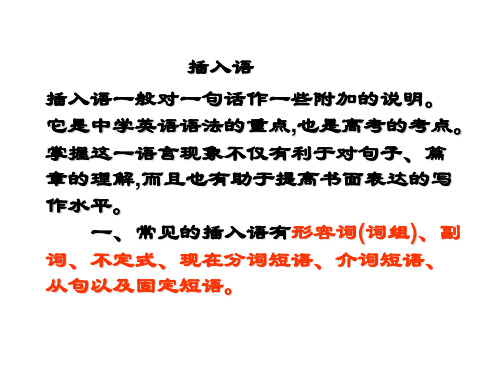
• That‘s a good idea, to be sure! To make things worse, many of the men have gone off to cities in search of higher pay.
• 3.常见的现在分词短语有:generally speaking; frankly speaking; judging from/by; talking of(谈到); considering(考虑到,因为是);putting it mildly(说得客气一点)等。这些分词用来修 饰全句。例如:
5. His father came home [C] at midnight, and ________, he was drunk. A. as a result B. that is to say C. what's more D. sooner or later
• Besides, I enjoy learning about new things from politics to sports and music. • He knows three foreign languages, namely, English, Japanese and Spanish. 但是有些词或短语可插在句子中, 不用逗号隔开。例如: What on earth are you doing here?
• In a way, I think we both won in the game. • 5.常见的从句有:if you don't mind; if you like; if you please; if necessary; if any; if I may say so; if convenient; as it happens等。例 如: [A] come to join us You can, ________, in the game. A. if you please B. if you possible C. if you happy D. if you necess It is always difficult being in a foreign country, [D] ________if you don't speak the language. (NMET2000) A. extremely B. naturally C. basically D. especially
高中语法专题解析插入语的种类和用法

高中语法专题解析插入语的种类和用法插入语是指在句子中起补充说明、加强语气或引起注意的成分。
在语法上,插入语不是句子的重要构成成分,但对于理解句子的含义和表达情感却起着重要作用。
本文将对插入语的种类和用法进行详细解析。
一、插入语的种类1. 感叹语:用来表达感叹或惊奇的情绪。
例如:"哇"、"天啊"、"好美啊"。
2. 感叹成分:用来表达感叹或惊奇的事物或人物。
例如:"这么大的房子啊"、"多么漂亮的花啊"。
3. 感叹词语:用来表示强烈的感情或情感。
例如:"太好了"、"太遗憾了"。
4. 插入语词:用来强调或补充说明的词语。
例如:"确实"、"实际上"、"毫无疑问"。
5. 拟声词:用来模拟某种声音或动作。
例如:"呼啦"、"碰"、"砰砰"。
6. 时距标志:用来表示时间或空间距离。
例如:"一年后"、"在那里"。
7. 专名、代词:用来指代特定名词或人物。
例如:"小明"、"玛丽"、"他"、"你"。
8. 人称词:用来指代特定的人称。
例如:"我"、"你"、"他"。
二、插入语的用法1. 前插语:插在句子开头,与主句相分离。
例如:"突然"、"顺便说一声"、"不知怎的"。
2. 后插语:插在句子结尾,与主句相分离。
例如:"我觉得"、"你知道吗"、"事实上"。
3. 中插语:插在句子中间,改变句子的语气或补充说明。
常见英语插入语
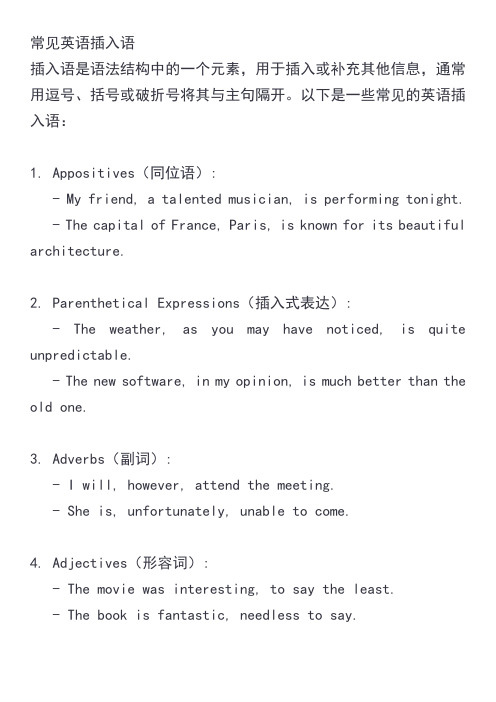
常见英语插入语插入语是语法结构中的一个元素,用于插入或补充其他信息,通常用逗号、括号或破折号将其与主句隔开。
以下是一些常见的英语插入语:1. Appositives(同位语):- My friend, a talented musician, is performing tonight. - The capital of France, Paris, is known for its beautiful architecture.2. Parenthetical Expressions(插入式表达):- The weather, as you may have noticed, is quite unpredictable.- The new software, in my opinion, is much better than the old one.3. Adverbs(副词):- I will, however, attend the meeting.- She is, unfortunately, unable to come.4. Adjectives(形容词):- The movie was interesting, to say the least.- The book is fantastic, needless to say.5. Exclamatory Expressions(感叹表达):- That was a great game, by the way!- Well, I never expected to see you here!6. Interrupters(打断语):- The professor, by the way, will be joining us shortly. - The weather, on the other hand, is perfect for a picnic.7. Quotations(引语):- He said, "I'll be there on time."- We heard the announcement, "The train is delayed."8. Direct Address(直接地址):- Jane, please pass me the salt.- Ladies and gentlemen, welcome to the event.这些插入语的使用能够使句子更加生动、具体,并且能够为读者提供额外的信息或情感色彩。
插入语(常见类型详述)
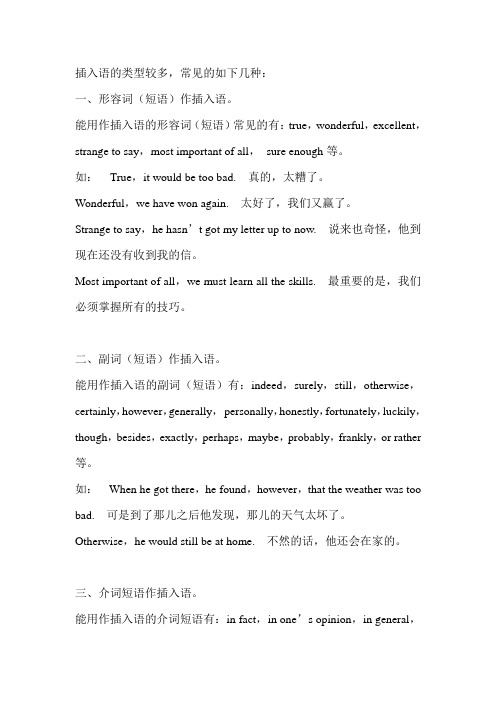
插入语的类型较多,常见的如下几种:一、形容词(短语)作插入语。
能用作插入语的形容词(短语)常见的有:true,wonderful,excellent,strange to say,most important of all,sure enough等。
如:True,it would be too bad.真的,太糟了。
Wonderful,we have won again.太好了,我们又赢了。
Strange to say,he hasn’t got my letter up to now.说来也奇怪,他到现在还没有收到我的信。
Most important of all,we must learn all the skills.最重要的是,我们必须掌握所有的技巧。
二、副词(短语)作插入语。
能用作插入语的副词(短语)有:indeed,surely,still,otherwise,certainly,however,generally,personally,honestly,fortunately,luckily,though,besides,exactly,perhaps,maybe,probably,frankly,or rather 等。
如:When he got there,he found,however,that the weather was too bad.可是到了那儿之后他发现,那儿的天气太坏了。
Otherwise,he would still be at home.不然的话,他还会在家的。
三、介词短语作插入语。
能用作插入语的介词短语有:in fact,in one’s opinion,in general,in a word,in other words,in a few words,of course,by the way,as a result,for example,on the contrary,on the other hand,to one’s surprise,in short,as a matter of fact,in conclusion,in brief等。
英语写作常用的插入语
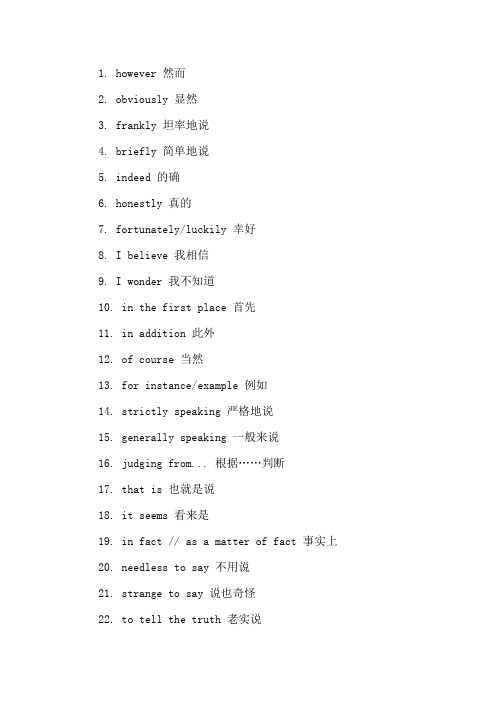
1. however 然而2. obviously 显然3. frankly 坦率地说4. briefly 简单地说5. indeed 的确6. honestly 真的7. fortunately/luckily 幸好8. I believe 我相信9. I wonder 我不知道10. in the first place 首先11. in addition 此外12. of course 当然13. for instance/example 例如14. strictly speaking 严格地说15. generally speaking 一般来说16. judging from... 根据……判断17. that is 也就是说18. it seems 看来是19. in fact // as a matter of fact 事实上20. needless to say 不用说21. strange to say 说也奇怪22. to tell the truth 老实说23. to be sure 无疑24. to sum up 概括地说25. I am sure 我可以肯定地说26. luckily/happily for sb. 算某人幸运27. most important of all 最为重要的是28. what is important/serious 重要/严重的是29. in general 一般而言30. in other words 换句话说31. in a sense 在某种意义上32. in my view // as I see it 在我看来33. from my point of view // from my perspective/viewpoint我认为34. in conclusion 总之35. in summary 概括地说36. in a few words // in sum // in short 简而言之。
插入语例子

插入语例子插入语是一种语法结构,通常是一个插入或附加到句子中的短语,用于补充信息、表达感情或引起注意。
插入语通常用逗号、括号或破折号括起来,但它并不是句子的主要部分。
以下是一些插入语的例子:1. 逗号插入语:• The book, in my opinion, is a masterpiece. (这本书,在我看来,是一部杰作。
)2. 括号插入语:• The team won the championship (against all odds) last night. (球队昨晚战胜一切不利因素赢得了冠军。
)3. 破折号插入语:• The test results—surprisingly—were better than expected. (测试结果——令人惊讶地——比预期的要好。
)4. 感叹插入语:• My goodness, that was a close call! (天哪,那真是险些出事!)5. 对比插入语:• The new employee, unlike the others, had previous experience in a similar role. (新员工,与其他人不同,曾在类似的职位上有过经验。
)6. 陈述插入语:• This movie—according to the reviews—is a must-watch. (这部电影——根据评论——是必看的。
)7. 时间插入语:• We will meet at the park, at three o'clock, weather permitting. (我们将在公园见面,如果天气允许的话,在三点。
)插入语的使用可以使句子更加丰富、生动,并允许作者在表达中增加额外的信息或情感。
在写作中,适度和合理使用插入语能够提升文章的表达力和吸引力。
插入语用法归纳
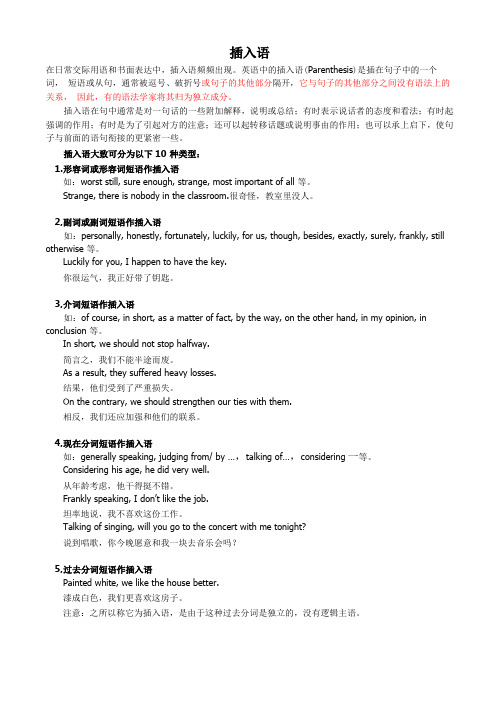
插入语在日常交际用语和书面表达中,插入语频频出现。
英语中的插入语(Parenthesis)是插在句子中的一个词,短语或从句,通常被逗号、破折号或句子的其他部分隔开,它与句子的其他部分之间没有语法上的关系,因此,有的语法学家将其归为独立成分。
插入语在句中通常是对一句话的一些附加解释,说明或总结;有时表示说话者的态度和看法;有时起强调的作用;有时是为了引起对方的注意;还可以起转移话题或说明事由的作用;也可以承上启下,使句子与前面的语句衔接的更紧密一些。
插入语大致可分为以下10种类型:1.形容词或形容词短语作插入语如:worst still, sure enough, strange, most important of all 等。
Strange, there is nobody in the classroom.很奇怪,教室里没人。
2,副词或副词短语作插入语如:personally, honestly, fortunately, luckily, for us, though, besides, exactly, surely, frankly, still otherwise 等。
Luckily for you, I happen to have the key.你很运气,我正好带了钥匙。
3,介词短语作插入语如:of course, in short, as a matter of fact, by the way, on the other hand, in my opinion, in conclusion 等。
In short, we should not stop halfway.简言之,我们不能半途而废。
As a result, they suffered heavy losses.结果,他们受到了严重损失。
On the contrary, we should strengthen our ties with them.相反,我们还应加强和他们的联系。
英语插入语——精选推荐

英语插⼊语摘⾃:插⼊语就是指插在句⼦中间,对句⼦起补充或附加的说明的成分。
插⼊语通常与句中其它成分没有语法上的关系,若将其去掉,句⼦结构仍然完整。
插⼊语在句中主要起解释、说明、总结等作⽤,此外还可⽤于表⽰说话者的态度和看法、起强调作⽤、引起别⽅的注意、转移话题、承上启下等。
插⼊语可能是⼀个词、⼀个短语或⼀个句⼦。
现在我们总结常见的8种插⼊语如下:1.副词⽤作插⼊语常作插⼊语的副词有:certainly(当然),surely(⽆疑),indeed(的确),however(然⽽),fortunately(幸运的是),luckily(幸运的是),probably(⼤概),personally(就个⼈来讲)等。
For example:Certainly, pets can help children develop friendship skills.宠物的确能够帮助孩⼦们培养交友技能。
Yes, indeed, I intend to go.是的,我真个想去。
2.介词短语⽤作插⼊语常作插⼊语的介词短语有:in fact(事实上),in one’s opinion(在某⼈看来),of course(当然),above all /first of all (⾸先),by the way (顺便)等。
For example:You have to admit that you are, in fact, in difficulties.你不得不承认,你事实上是陷⼊了困境。
In fact, those people have been promoted.事实上,那些⼈已经升职了。
The only honest answer is, of course, yes.唯⼀诚实的回答⾃然是“是”。
3.不定式作插⼊语常作插⼊语的不定式有:to be frank(坦率地说),to tell(you )the truth(⽼实说),to be sure(当然)等。
- 1、下载文档前请自行甄别文档内容的完整性,平台不提供额外的编辑、内容补充、找答案等附加服务。
- 2、"仅部分预览"的文档,不可在线预览部分如存在完整性等问题,可反馈申请退款(可完整预览的文档不适用该条件!)。
- 3、如文档侵犯您的权益,请联系客服反馈,我们会尽快为您处理(人工客服工作时间:9:00-18:30)。
插入语的用法在英语学习中,插入语是一个比较重要的知识点。
由于插入语是一种独立成分,通常与句中其他成分没有语法上的关系,许多同学在学习过程中会有一定的困难。
其实,插入语大都是对一句话进行附加说明或解释,通常由一个词、一个短语或一个句子构成,常置于句首、句中或句末,一般用逗号或破折号与句子隔开。
下面举例归纳插入语的几种用法。
例1 _____the more expensive the camera, the better its quality.A.General speakingB.Speaking generalC.Generally speakingD.Speaking generally解析:本题答案为C.generally speaking为分词短语,意思是“一般来说”,在句中用作插入语。
小结:许多分词短语可以用作插入语,这样的分词短语有:strictly speaking (严格地说),generally considering(一般认为),judging from……(根据……判断)等。
例2 Two middle-aged passengers fell into the sea. ____,neither of them could swim.A.In factB.LuckilyC.UnfortunatelyD.Naturally解析:本题答案为C.unfortunately为副词,意思是“令人遗憾地,不巧,可惜”,在句中用作插入语。
小结:常用作插入语的副词或副词短语有:indeed(的确),surely(无疑),however(然而),frankly(坦率地说),obviously(显然),naturally(天然地),luckily (happily) for sb.(算某人幸运),fortunately(幸好),strangely(奇怪),briefly(简单地说)等。
例3 Your performance in the driving test didn’t reach the required standard,_____, you failed.A.in the endB.after allC.in other wordsD.at the same time解析:本题答案为C.in other words为介词短语,意思是“换句话说”,在句中用作插入语。
小结:常用作插入语的介词短语有:in conclusion(总之),in a word(简而言之),in short(简而言之),in general(一般说来),in a sense(在某种意义上),in my view(在我看来),in his opinion(按照他的看法),in fact(事实上),at first(首先), in addition(此外),of course(当然),to my surprise(使我惊奇的),to her regret(使她遗憾的),for example (例如)等。
例4 It is so nice to hear from her._____,we last met more than thirty years ago.A.What‘s moreB.That is to sayC.In other wordsD.Believe it or not解析:本题答案为D.believe it or not为一分句,意思是“信不信由你”,在句中作插入语。
小结:用简短的句子结构作插入语,它们常置于句中或句末。
这类简短的句子有:I am sure(我可以肯定地说),I believe(我相信),do you know(你知道吗),you see(你明白),I’m afraid(恐怕),it is said(据说),I suppose (我想),what’s more(而且),what’s worse(更糟糕的是),that is (也就是说),what is important(重要的是)等。
例5 _____ with you,I have no money to spare.A.To be frankB.What’s moreC.In additionD.However解析:本题答案为A.to be frank为不定式短语,意思是“坦率地说”,在句中用作插入语。
小结:常用作插入语的不定式短语有:to be sure(无疑地),to sum up(概括地说),to tell the truth(老实说)等。
例6 _____, he should have done such a thing.A.Speaking generalB.Strange to sayC.LuckilyD.Of course解析:本题答案为B.strange to say为形容词短语,意思是“说也奇怪”,在句中用作插入语。
小结:常用作插入语的形容词或其短语有:true(真的),funny(真可笑),needless to say(不用说),most important of all(最为重要),worse still (更糟糕的),even better(更好)等。
【试题设计】1._____, he often forgot to turn off the lights.A.Even betterB.StrangeC.HoweverD.Fortunately2.Greenland, _____ island in the world,covers over two million square kilometers.A.it is the largestB.that is the largestC.is the largestD.the largest3.An awful accident_____,however,occur the other day.A.doesB.didC.has toD.had to4.Yesterday Jane walked away from the discussion. Otherwise,she ____ something she would regret later.A.had saidB.saidC.might sayD.might have said5.Boris has brains. In fact,I doubt whether anyone in the class has ____IQ.A.a highB.a higherC.the higherD.the highest6.Helen was much kinder to her youngest son than to the others, _____,of course,made the others envy him.A.whoB.thatC.whatD.which7._____ the general state of his health,it may take him a while to recover from the operation.A.GivenB.To giveC.GivingD.Having given8._____,success results from hard work.A.Worse stillB.Sure enoughC.To sum upD.What’s worse9.As I know,there is _____ car in this neighborhood.A.no suchB.no aC.not suchD.no such a10.He made another wonderful discovery, _____ of great importance to science.A.which I think isB.which I think it isC.which I think itD.I think which is11.One day, _____,Newton saw an apple fall from a tree.A.to sum upB.what’s moreC. it is saidD.in addition【参考答案】1~5 BDBDB 6~11 DACAAC带插入语的特殊疑问句是英语中的重要句型,使用这种句型应注意下列几点。
一、分析句子性质,确定句首单词带插入语的特殊疑问句,虽有插入语的介入,但在句子性质上仍属特殊疑问句,因此句首单词不能用doyouthink/believe/suppose等结构中的do,而应使用特殊疑问词。
二、根据特殊疑问句语序的需要,调整插入语的语序特殊疑问句结构要求特殊疑问词后边用疑问式倒装语序,但在增加了插入语后,特殊疑问句的内容不再是原来的内容,而是接插入语,所以插入语应使用疑问式倒装语序。
例1你认为他什么时候来?误:doyouthinkwhenhewillcome?误:whenyouthinkhewillcome?正:whendoyouthinkhewillcome?例2你认为他会做什么?误:doyousupposewhathewilldo?误:whatyousupposehewilldo?正:whatdoyousupposehewilldo?三、分析插入语对句子结构造成的影响,确定插入语后句的语序插入语虽然不是句子不可缺少的内容,但因其介入,对原特殊疑问句的结构还是造成一定影响的,插入语后句应视为宾语从句,采用陈述语序。
插入语 Parenthesis当一个词、短语或从句用在句中,与句子其他成分没有语法上的关系时,它就叫独立成分,独立成分分为惊叹语、呼语和插入语。
插入语表示说话人的态度或看法,对一句话做一些附加的解释或说明。
常见的插入语有副词、动词-ing形式、动词不定式、介词词组与从句几种。
副词(Adverbs: actually, briefly, etc.)--Obviously, the machine needs oil.--Honestly, I don’t need it at the moment.--Briefly, there is nothing more we could do about it.--Luckily for him, the gun was not loaded.--Besides, we have to consider their health condition.--Still, that’s an important question.--Otherwise, we would commit a serious mistake.--It’s hard work. I enjoyed it, though.--Nevertheless, we should pay due attention to it.注意区别以下两句中的副词:--Naturally, the children are behaving well while you are here. (插入语,说明整个句子) --The children behaved naturally. (状语,修饰谓语动词)属于这类的副词还有:actually, admittedly, basically, certainly, definitely, surely, fortunately,luckily, frankly, hopefully, apparently, maybe, perhaps, possibly, presumably, probably,personally, strangely等。
